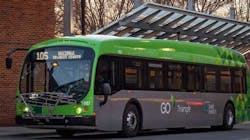GoTriangle Board of Trustees approves funding to purchase five battery-electric buses
On May 24, GoTriangle’s Board of Trustees approved $5.9 million in funds to purchase five battery-electric buses. The vehicles, expected to be delivered by mid-2025, will replace existing diesel vehicles that have reached the end of their useful life and will bring GoTriangle’s electric fleet to seven buses. The new buses are funded by a combination of local revenues and federal sources. They include the Raleigh Union Station (RUS) Bus Facility grant and funding that U.S. Rep. David Price (D-NC-4) included in the federal fiscal year 2023 budget for a Congressional Community Project.
To maximize use of these five new and its two existing battery-electric buses, GoTriangle submitted an application to the federal Low or No Emission grant program in April to buy two types of bus chargers and supporting electrical equipment for $2 million. GoTriangle’s Nelson Road Bus Operations and Maintenance Facility would receive three new chargers – each capable of charging two buses. These chargers would be plug-in depot chargers, similar to the two GoTriangle already has that allow buses to charge overnight and during the middle of day when buses are out of service. The RUS Bus Facility would receive two overhead fast chargers that allow buses to quickly charge in between trips, allowing the new battery electric buses to operate for longer periods without needing to go back to the maintenance facility to charge.
Long-term plan: Acquiring more electric buses and sharing regional charging with transit partners
In addition to these short-term efforts, the agency’s Regional Fleet and Facilities Study will develop attainable long-term goals to convert a larger portion of the fleet to battery-electric propulsion. To date, the study conducted an assessment of available low- and no-emission vehicle propulsion types, fueling and charging infrastructure, funding opportunities and opportunities to partner with other transit service providers within the Triangle.
The study includes an evaluation of future transit service plans to determine vehicle and charging infrastructure needs. The study will also include recommendations for shared regional charging infrastructure supporting reliable operations among multiple transit providers. This work is anticipated to conclude in fall 2023, with adoption of fleet electrification goals by GoTriangle’s board.
